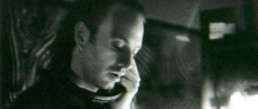RSD, perhaps better known as Bristol bass and drum music stalwart Rob Smith (one half of respected production duo Smith and Mighty), has been pushing bass heavy rhythms for more than two decades. Under the moniker RSD, Rob Smith produces fresh, innovative bass music that simultaneously pays dues to his deep soundsystem roots while pushing things ever forward – he remains firmly at the forefront of Bristol’s endlessly inventive music scene.
NiceUp talked to RSD a week before he touches down for his debut NZ tour – Thursday 19 in Wellington, Friday 20 in Dunedin and Wednesday 25 in Auckland.
Rob, you’re touring NZ shortly under your RSD alias – how would you describe the RSD sound to someone who’s new to it?
I guess a simple description would be dubstep with an accent on the reggae and dub side of things.
Tell us about your musical background prior to RSD?
I started playing guitar in a reggae band in the early 80s and around 1985 I hooked up with Ray Mighty and formed the Three Stripe record label. We began releasing records as Smith & Mighty with a sound that was based on hip hop beats with reggae and dub treatments, often with female vocals and with a kind of sixties flavour using sampled string sounds and effects.
As well as releasing our own singles, we were remixing other bands and also produced the first Massive Attack single Any Love. We were later joined by Peter Rose and in around 1994 we began DJing and releasing reggae and dub inspired jungle tunes as More Rockers.
I also record as Blue & Red and, alongside Henry & Lewis, produced the Time Will Tell project featuring vocal performances from many of our Jamaican heroes like Johnny Clarke and Willie Williams.
Dubstep sometimes seems like an odd term to me – a lot of the stuff coming out of the so-called ‘dubstep genre’ seems to have hardly anything in common with the original dub sound. However one thing that really strikes me about RSD is the heavy reggae flavours in your sound…
I love reggae! It was that sound that made me want to become a producer. I really wanted to be able to make those dub effects and heavy bass sounds that I was hearing from people like Scientist, Shaka and King Tubby’s. Reggae has a real infectiousness about it – I think that’s why so many genres include reggae flavours, like jungle and dubstep.
Can you recommend any other reggae-inspired dubstep artists?
For me, Mala and DMZ put the ‘dub’ into dubstep – maybe not in a traditional reggae sense – but it’s definitely dub! Also DJG, Evergreen & Landlord, and Mungo’s Hi Fi have a strong reggae feel.
Another thing that strikes me about RSD is your unique heavyweight bass lines – what do you think distinguishes your low-end from the rest?
Hmm…well there are a lot of producers right now who are making amazingly bass heavy productions! But I guess I’m coming from an old-school angle where the bass line has a melody as well as a big sub sound.
Without giving away too many secrets, can you tell us about your production set-up?
It’s mainly computer based with a small amount of outboard gear. I often use real sounds and instruments and try to treat everything with a ‘dub’ attitude.
The NZ dubstep scene has occasionally been referred to as sausage-wobble – on account of the distinct lack of girls going along to gigs (although to be fair, there’s been a recent upward trend in the number of females). What’s the gender-balance like at the dubstep gigs in your part of the world?
In the UK it’s actually quite balanced – a lot of girls are in to it and many also DJ and produce. I’ve been playing in Japan this month and I’ve noticed that there are also many girls at dubstep events there too.
That’s good to hear! What can we expect to hear played during an RSD set? Will it be a strictly dubstep affair?
It’s my take on dubstep with an emphasis on the aspects that get me interested – bass, reggae and maybe more vocal tracks than your average dubstep set.
Finally, where do you see dubstep heading in the future – is it destined to follow the course of jungle?
Well it is similar to the excitement and rapid growth of the jungle movement in the 90’s, but it feels more organic to me and seems to be supported by a much broader and more international community. I’m happy to watch it take its course.
Many thanks Rob – I think the RSD sound will go down a treat in Aotearoa…
More info:
RSD Facebook
Naram
Related posts
YT NiceUp Interview Special
September 16, 2013
Sugar Minott NiceUp Interview Special
September 14, 2013
Deadly Hunta NiceUp Interview Special
September 15, 2013




